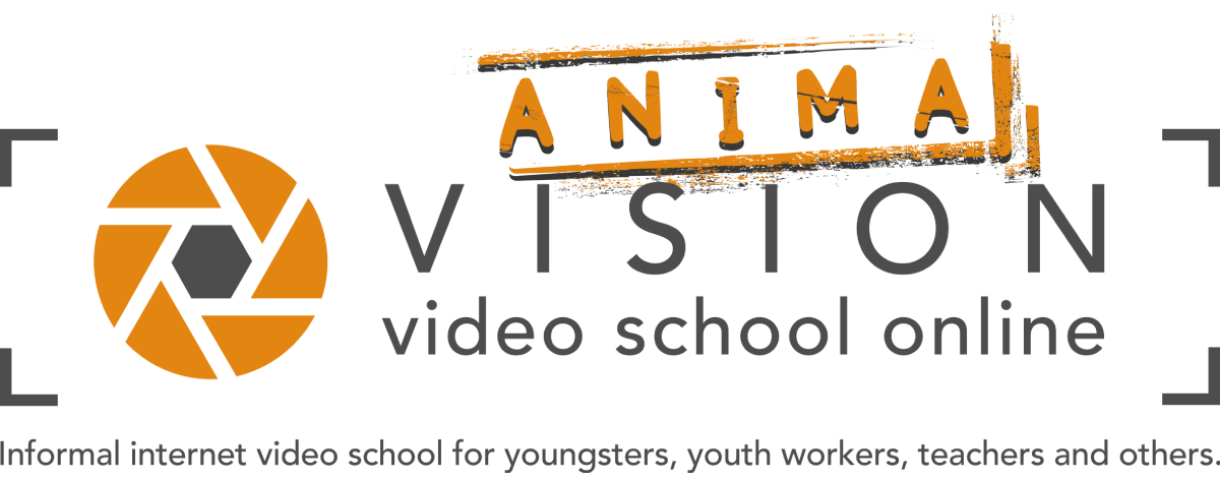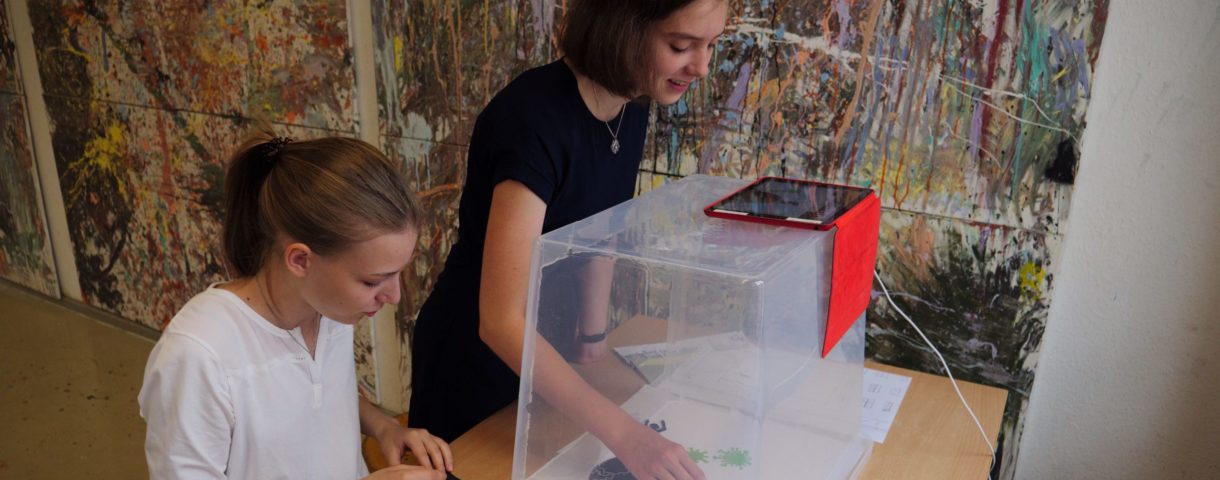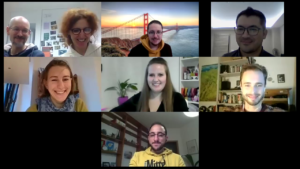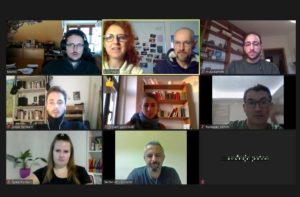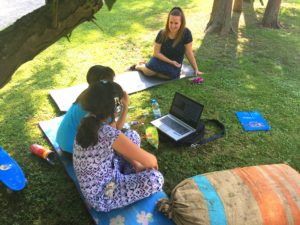The Animavision project started shortly after the first coronavirus outbreak in 2020 that influenced the project work enormously. In this chapter we youth workers share our stories on how we coped with new situations and tried to implement the project activities.
Keeping motivated, staying resilient
Mia Brunej
When applying for the project Animavision we didn’t expect that the living situation and the way we work is able to change so quickly. It was a bit before the first coronavirus outbreak in 2020 that the application date was due and everything in the project was planned with the assumption that the world will be spinning around just the way it was for at least a couple of years more.
The happy news of the project being approved came after some months when it was already quite clear that the pandemic situation will continue and we will not be able to start and execute the project in the ‘old ways’. So the decision had to be made quite quickly. Should we postpone or should we adjust? The information coming from the national agency of the Erasmus+ project in the field of youth made us believe that execution is an option. So we decided to give it a go. Although that meant mostly working with young people online and meeting our international partners mostly in internet environment not being able to discuss things in person. It also meant not getting to know each other through multi-day cooperation in person that many times brings new ways and new ideas that get quickly and naturally integrated in the future work, was not a realistic option. But som of us knew eachother from before and we felt it was not the time to let things go. Just the opposite. It was the time to grab them even more firmly in our hands, stay active and positive and try to include as many especially young people as possible. For the young people it was especially worth it because they were – due to coronavirus – one of the groups mostly deprived from their normality.
Two of three training for youth workers took place online
First months of the project were meant for training for youth workers, buying the necessary equipment for testing with young people and setting a clear plan on writing the intellectual result, the additional chapters of this videoshool that you are currently visiting. It surprised us how online cooperation actually worked. It was different from the ‘live’ version but it offered us new possibilities. It became quite clear that some parts of cooperation are sometimes quite productive in the internet environment. If you are able to redistribute your time and your activities according to your needs it can be quite refreshing and less time consuming as meeting in person in another country. Also screen sharing and notes sharing can help presenting some facts in a very good way. We would not change it for meeting in person if possible but were able to take advantage of the positive sites that digital world offered.
But when we started to work and test new methods with young people, these positive experiences came to the verge of frustration. In the meantime online life became our and their norm for many months, the schools were closed, the afternoon activities shut down completely. We often talked with partner organizations how funny it is that only months ago we tried to turn young people away from smartphones and internet with our activities. Now the time came to encourage them to connect most of the time and to use even more features that smarphones offer then before.
In the beginning it was not easy, no one really was able to implement the use of online tools well. That was definitely the first obstacle. Luckily in Slovenia at that time most young people already had a smartphone. But it was not the equipment that was the main advantage (or obstacle) for involvement. It was more the access to information and also motivation. Sometimes we went around on the streets where young people were still hanging around after the online school and encouraged them (from a safe distance) to come and join our online workshops. We communicated with them also through many different channels, through social media, through email, through SMS, through phone calls and through teachers and parents. There was also some one-on-one communication.
In the beginning everything felt weird and unnatural, but it was the only way. And we felt that it was important. It was extremely important that they didn’t shut themselves off, that they were able to meet each other, that we were able to discuss also topics not directly connected to the workshop, that we got a feeling if they are ok and made suggestions what to do if they were not. But the practical ‘film’ results of workshops were so good. Without the presence of the mentor in person the participants were able to deal with theory but not so much with practice. There was also a big lack of motivation to go away from the screen and do something with their hands that is almost never happening when working in person. There was not much per-to-per communication and learning. We had to lower our expectations as mentors, think of simplifying the learning tools and the creative process and focus on the importance of the contact and just checking in. It was clear that this is not an appropriate way for working with young people in the long run and the younger the participants were the less suitable it was for them.
In the video Po(ne)srečena čarovnija /(Un)fotunate magic LIJAMedia – SI you can compare the animation made individually at home (first part of the film) and on the ‚live‘ workshop (second part of the film).
The second solution we found was to move some activities to the summer holidays. In that period the restrictions were due to better health, not so strict and we were able to meet outside. Summer activities were not initially planned in the project but showed themselves as better versions than the online activities. As a mentor personally at the time I didn’t think much about my side of the bargain. I just kept adjusting day by day and tried to make things work. But when the severe version of the lock down ended I felt relieved and was happy that this not became our reality.
Participants editing in the park
A big motivation for keeping things going for our organization was also a constant contact with the international partners. We had regular online meetings that usually started with the coronavirus situation in each country before we even started with the meeting agenda. It was nice and soothing to see other youth workers dealing well with their situations. We encouraged each other when there were severe numbers and restrictions in a particular country or when some of us got stuck in our work. There was also some fear and unease about the future that we shared. We also shared insider information about the situation in each country that we could compare to the information that the media were giving to us. The partnership and common tasks were lifting me up and giving me an additional sense of purpose and direction.
It is not a shame to talk also about our – youth workers – occasional lack of motivation. I personally had to invest into me being ‘up’ for the others, into not giving up and into staying focused and active. I went outside a lot, in the nature, catching fresh air and movement, trying to avoid the constant stream of heavy information sometimes majorly exaggerated by the media. It is enough to hear the news once a day, it doesn’t change a thing if you follow it every hour. It just robs you of motivation to keep active and positive. Our organization was the applicant organization in charge of the project running smoothly and that put even more responsibility on us.
Sometimes I also remembered the stories that my grandma was telling me when I was little, from the period of the second world war. That period was a big crisis for most of the Europe and time that slowly diminishes in our memory. What all they had to overcome and deal with! Also a period of a Slovenian war and parting from Yugoslavia when I was a teenager and when there was no internet, not so much different food and education available was tense. But people managed to adapt, survive find hope and fight for better times. And such memories subconsciously give you strength.
Parallel to many opportunities and innovations, a possibility of a bigger planetarian (for example environmental and as experienced also health) and personal crisis, together with increasing mental health issues is representing a danger for today’s young people. The world is quick, extremely complex and – as seen in the last years – also vulnerable. All of us and especially young people who grew up in confort, rising economy and peace are definitely dealing with new realities and they are maybe being less equipped with resilience and survival skills than generations before. Since the extraordinary conditions may not be a one-time event in their lives, different kinds of youth projects can also help them to develop in different ways and empower them to face current and still to come challenges easier.
Don’t give up & Stay positive
Ramazan DERİN
When the project application results were announced and we learned that our project was accepted, we had understood the seriousness of the pandemic, witnessed the quarantine practices in the world and understood that this pandemic would not end soon. We believed that the pandemic could end and everything could return to normal before our project activities started, with a hope and a sense of relief from the relaxation of the measures in the summer period. However, September came, summer ended and nothing changed, on the contrary, the measures were increased. On the one hand, we had concerns about how the project would be done in this process, and on the other hand, we had the indecision to postpone the project. However, as the project partners, we have decided to carry out the project in the current conditions, regardless of the situation. These conditions were as follows: in August and September of 2020, when our project started, schools in Turkey would mostly provide distance education, it was forbidden to go out in the evenings and on weekends, cafes, restaurants, non-governmental organizations were closed and it was forbidden to gather together. Our project coordinator Slovenia and our other partner Germany had similar restrictions. Everyone had questions about carrying out the project activities under these conditions. Because we have never had such an experience before and the unknowns were too much. However, our project coordinator put us at ease and convinced us that we would do our best. The content of our project was a brand new topic for me and I had no previous experience in the field. First, we tried to improve ourselves in this topic through the internet. We read articles about stop-motion, which is our project topic, watched videos and tried to make stop-motion movies. We held online meetings with our project partners who are more experienced in this regard. So, rather than giving up, we somehow took action. We were making progress, albeit slowly. When we started face-to-face education at school on a limited basis, we introduced the project to the students and tried to involve them in the project. Afterwards, we started to give regular online stop-motion trainings with these students. Although the idea seems simple, it was not so easy to provide project trainings to students online. At this stage, we encountered some difficulties and we solved some of them but some of them we couldn’t. At first, our financially disadvantaged students did not have a computer or internet access, or their internet access was very limited, and our students living outside the city center also had internet access problems. They were often able to attend online trainings with their families or their own mobile phones. Since the project was different to the students as a subject, the students were very enthusiastic and highly motivated at the beginning. However, over time, this desire and motivation decreased a lot. There were some reasons for this. First, students were taking all of their classes online via distance learning, and they were overwhelmed by such intense online training. Secondly, constantly explaining the subject of the project (stop-motion) theoretically bored them and caused them to lose their motivation. Now they wanted to see and do something practically besides theoretical knowledge. At this point, we were watching videos related to our topic and shooting similar animation videos at our home in order to make online training more enjoyable. Sometimes we were pushing the students to motivate them and sometimes we were leaving them free so that they would not get bored in the trainings. It was a process that required a very delicate balance. That’s what we were able to do, because the restrictions were still in place. However, as of September 2021, many of the restrictions were lifted and we finally started face-to-face training. Again, we introduced our project to our students and included new students in our study groups. At school, we were now able to shoot stop motion animation videos practically. Students enjoyed this process very much. They learned many things faster. We aimed to make them more productive and motivated by trying to make their work environment as comfortable and comfortable as possible (some music, snacks and drinks). In general, this method worked.
Another activity of our project was training activity for youth workers. We had a total of 3 training activities, 2 in Germany and 1 in Slovenia. However, due to the pandemic conditions, we held 2 of these trainings online. Indeed, these online tutorials turned out to be more helpful than I expected. In addition to the training, we created our story and script for a joint animated film and distributed the scenes by task distribution. Then we were finally able to carry out the third training activity in Germany in September 2021, when the restrictions were eased. It was very good for everyone to come together and meet face to face with our project partners after a long time and online meetings. We had the chance to shoot our co-created story and a beautiful animation video came out. I think we achieved this with the patience, dedication and ability of all partners to overcome difficulties.
In addition, we have overcome these difficulties thanks to the communication that was established by our project coordinator with us throughout this pandemic process. In the online meetings we held regularly every month, we were talking about the progress of the project, as well as talking about how the pandemic process was going on in our countries, and we were having a kind of trouble. This was something that made me very comfortable and made me feel good. In this way, I believe that a strong bond is formed between the partners. As a trainer, I can say that this is what kept me motivated in this project. I always believed that we would somehow overcome the difficulties.
Finally, I can say that we overcame the difficulties in this whole process with our good communication and our determination to never give up. When you start a project, you will face difficulties, but the important thing is to never give up and somehow overcome these difficulties together with all your project partners and with the strength and motivation you get from them.
Crises require flexibility and innovation
Martin Kahles, Germany
I live and work in the federal state of Saxony-Anhalt in Germany. I still remember a meme at the beginning of March 2020 in which Saxony-Anhalt was portrayed as the only federal state where you could still party without worries. The virus had not yet been detected here, unlike in all the other federal states. I thought it was funny at the time, because the pandemic and its effects were not tangible for me, the situation seemed surreal.
But that changed quickly. The numbers of infected people, patients in hospitals and intensive care units, and deaths rose rapidly. Even though there were very different opinions among serious German scientists on how to deal with the virus, it was widely agreed that Covid-19 posed a very real threat to health and life.
Apart from this threat from the virus itself, however, it was primarily the change in the social climate that was a great burden for me. So there were protests quite quickly all over Germany and also in my home town of Halle (Saale) from people who thought the virus was a hoax or merely compared its health effects with those of influenza.
These different perceptions of Covid-19 were a great challenge for me and made me feel very insecure on a daily basis. I also sometimes wondered if something was being blown out of proportion by politics or the media. For a long time, I didn’t know anyone who had fallen ill with Covid-19 or even died. But I remembered that I didn’t know anyone who had died in a road accident, and I would never doubt that road accidents do happen.
In the end, however, it was the Corona illnesses and the subsequent Long Covid consequences of young and healthy people from my private environment that made me feel and understand the devastating effects of the pandemic. With regard to the tightened hygiene regulations and vaccinations, science again gave me pause with the so-called prevention paradox. Prevention paradox means that the number of illnesses and deaths is not increasing because measures are being taken against it, while the opponents of the measures and vaccinations say that it can’t be that bad because the numbers are so low.
The different opinions also permeated my private environment, which also led to a deterioration of private relationships. Because there were only online choir rehearsals, I lost the desire to sing. As a result, I also lacked the necessary balance to my professional life.
It also became a daily challenge not to be triggered too much by contrary opinions that reached me via the media or from my personal environment, or to learn to let contrary opinions stand without reacting too emotionally to them.
In terms of lockdown work in WTV’s educational projects in general, we switched completely to online activities or offered boxes with different creative activities that we distributed to schools or brought home to children and young people. Our various supporters were also keen to continue the projects in other ways and they advised and supported us in this.
Likewise, we in the Animavision team decided not to throw in the towel and continue.
However, with regard to the educational work with children and young people for Animavision via online conferences during the first hard lockdown, we quickly became disillusioned due to the lack of reliability in participation. The children and young people lacked daily structures and since participation was not compulsory, unlike in class, the participants, most of whom had been won with great effort, quickly lost motivation. Nevertheless, we did not give up, because we realised that especially in times of closed schools and contact restrictions, it was all the more important that children and young people had contact with us educators or with other children and young people, even if only online.
It was a great relief when we were again able to carry out projects in our institution and in other children’s and youth institutions and in schools where we were present. Even though it was not yet possible to look at the face because of the masks, this was an enormous relief and made it possible to work with the young people in small teams and to have personal communication and support from us educators.
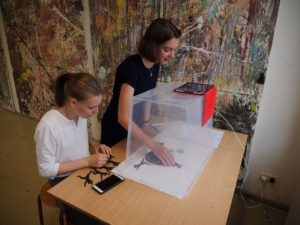
Students not loosing their good mood during the pandemic
The stress of the pandemic on the young people was clearly noticeable despite the regained possibility of face-to-face teaching. They had to catch up on a lot of material and they still suffered from the restrictions in terms of personal contacts and the anxiety caused by the pandemic.
We therefore decided to give the young people more time as usual before the pandemic and let them see the creative activity as a form of relaxation rather than putting them under pressure in terms of timing of completion and results. It seemed that pressure did not help at all during the pandemic, rather it achieved the opposite.
Among the project partners, regular online communication helped us to stay motivated and sometimes not to despair. Compared to the time before the pandemic, we exchanged much more about the current situation and also about how we felt, and also provided much more support to each other on a personal level. It was good to hear that the project partners abroad were struggling with more or less the same problems as we were.
And I was very happy that we managed to organise a training in Germany at the end of August / beginning of September 2021, which gave the project partners and other participants in the training the opportunity to meet again and get to know each other personally.
Despite all the adversities that unfortunately still persist, the pandemic has also often shown me to appreciate more what was taken for granted before the pandemic and to be grateful for what seems to be taken for granted.
And the pandemic has shown us as staff of our institution and as part of the Animavisions team that we are able to react flexibly and innovatively to difficult situations!
Renew Yourself
Sertan AY / Turkey
I have been among young people for years, it is quite fun and good to work with young people. I always find the opportunity to renew myself. Turkey has a young population, young people are our future. It is necessary to add value to the lives of young people, to guide them, to offer opportunities and to guide them. Projects are very effective in touching the lives of young people. It offers incredible opportunities to young people. This is very effective in my work with young people. We have the opportunity to see the effect of a work we do immediately and we get great feedback from young people.
Our world is changing very fast, but this change brings with it many problems and uncertainties. Young people in Turkey have very serious problems and unfortunately our young people have difficulties in solving these problems or determining their future. However, we believe that every problem has a solution and that young people will live in a beautiful future. We have had a very difficult pandemic process, we have gained new habits, we are suffering from economic difficulties. Among these difficulties, our young people have difficulties in developing themselves and gaining new gains. We have to be productive, we must not give up.
I have been a teacher for 19 years and I have been doing Erasmus projects for 13 years. I took part in many youth projects. I am happy to share my experiences with young people. Many young people need direction, all we have to do is give them the opportunity to guide them. Young people have enough energy, we, as youth leaders, only give them an opportunity. Young people who take advantage of these opportunities change their lives.
Seeing that I am useful to young people and getting positive results is my biggest motivation. I have good communication with young people and I get along well with them. In this Animavision project that we did, we offered a different experience to our young people with limited opportunities in our region, it was both fun and useful work. These achievements also support us to produce new projects.
